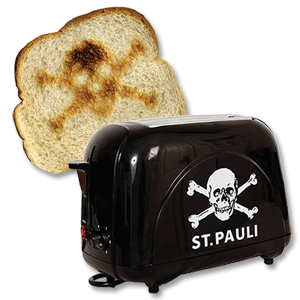 I’ve already said I’d like to see Wrexham run by the fans. I’m not saying I’d exclude the experience and knowledge that a well-intentioned businessperson could bring to the party but they’d have to be willing to work with the WST and accept that, ultimately, the club belongs to the fans and is run for their benefit.
I’ve already said I’d like to see Wrexham run by the fans. I’m not saying I’d exclude the experience and knowledge that a well-intentioned businessperson could bring to the party but they’d have to be willing to work with the WST and accept that, ultimately, the club belongs to the fans and is run for their benefit. I’ve also already offered up AFC Wimbledon as a superb example to follow. Well, here’s another club we can learn from.
Saint Pauli is, through no fault of its own, in danger of becoming a cliché. The venerable German anti-institution has stood for all things counter-culture since it was, as the club badge says, “non-established in 1910” in the red light district of Hamburg.
As word of its famed rebellious attitude has spread, it has become increasingly the subject of media attention, and that has changed how it is perceived. That doesn’t necessarily mean the club itself has altered, but the world’s view of St Pauli seems almost to be taken through Disney-tinted spectacles. They’re seen as that cute, naughty club who don’t play by the rules. However, they’re much more than that, and in many ways offer a blueprint which a club like Wrexham would do well to heed.
Simply aping another club would be madness. You can’t recreate the set of circumstances which brings a club with a certain je ne sais quoi into being. The St Pauli attitude was born from a close proximity to the Reeperbahn and accentuated by its association with the Hafenstrasse protests of the 1980s, when anarchists, punks and a wide range of liberal and left-wing thinkers occupied some houses which were scheduled for demolition and fostered a radical non-conformism which seeped into every corner of the suburb. That can’t be recreated. But some of the positive innovations that have developed from that certainly can.
Certainly, St Pauli the club and St Pauli the neighbourhood are indivisible. They share a common outlook on life and support each other. The club runs a project, set up by fans, which supports kids with problems in the area, for example.
The fans have real power at St Pauli too, so when the idea of the Millerntor ground being renamed was mooted by the club president, the idea was swiftly shot down. Are you starting to see why there are elements of Saint Pauli’s approach which appeal to me?
Another innovation at St Pauli is one which shows this is a club mature enough to break from the accepted, mindlessly unquestioned way of doing things, and is also able to have a clear view of what is actually important at the club. Fifteen minutes before kick-off at every home game, the PA system s switched off, not to come back on until the bells of AC/DC’s “Hell’s Bells” toll the teams onto the pitch. The idea is that the fans then can have a quarter of an hour to sing, getting themselves ready for the game, and creating a proper atmosphere.
Can you imagine how blissful that would be? No inane chatter from pitch-side. No artificial attempts to whip us up into a frenzy. Just pure fan power. Anyone who has been through the New Wembley experience would surely prefer such a genuine atmosphere would be to the artificial racket generated by being told to make some noise for your team (do we have to be told to do that?) over blaring play-backs of the Black Eyed Peas and Status Quo.
One accidental but potentially beneficial side-effect of having such a clear identity is that St Pauli has become a brand. The skull and crossbones, apocryphally first hoisted at a match by a punk who, strolling through a fair to the ground, stole a children’s flag on the way, has become synonymous with the rebel state whose national team plays in the Bundesliga.
Clearly having such a clear identity, backed up consistently by the club’s actions, creates something you can sell. Not that St Pauli have been too successful in doing that. When they were on their uppers they sold away their merchandising rights for thirty years, a move which almost defies logic. After all, what club operates without being able to fully exploit its commercial potential? Which club would hobble itself in its ability to benefit from its own name? It’s like a club running its stock down in an embarrassingly empty club shop, isn’t it? And which club would do that?
Oh yeah.
We do have a brand though. We’re the only club of our scale in North- or Mid-Wales, a fact I notice Stephanie Booth has been quick to pick up on. Andy Gilpin wrote an excellent piece in the Daily Post a while back discussing how we ought to exploit the unique position this puts us in to become a genuinely inclusive community club with a wide-ranging remit.
I’ve grown up with stories of how the club treated local businesses badly, and heard more tales than you could imagine of disgruntled sponsors turning their backs on The Racecourse after being messed around. Well, a club run on decent principles and values, which treats people well, is the sort that creates loyalty. And when that loyalty is manifested in people being willing to sponsor the club, or fans proud enough to want a quarter of an hour before the game to create their own atmosphere, you know you’ve got a club to be proud of.




No comments:
Post a Comment